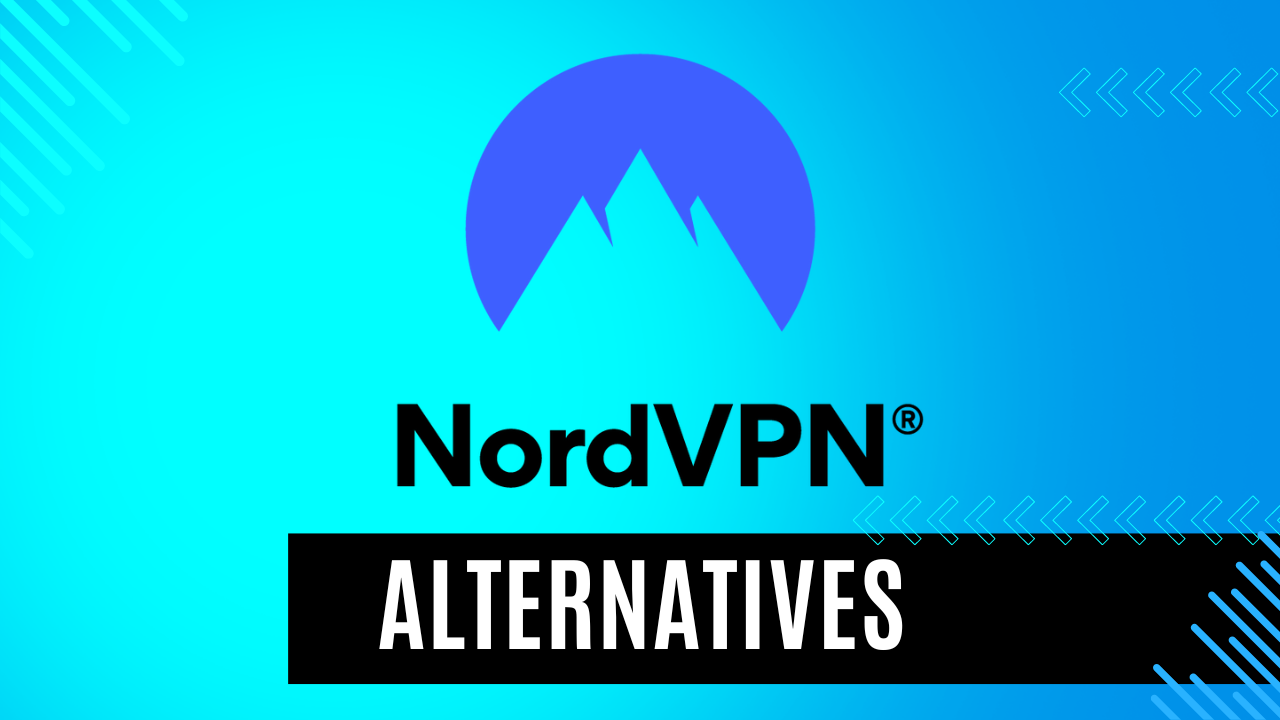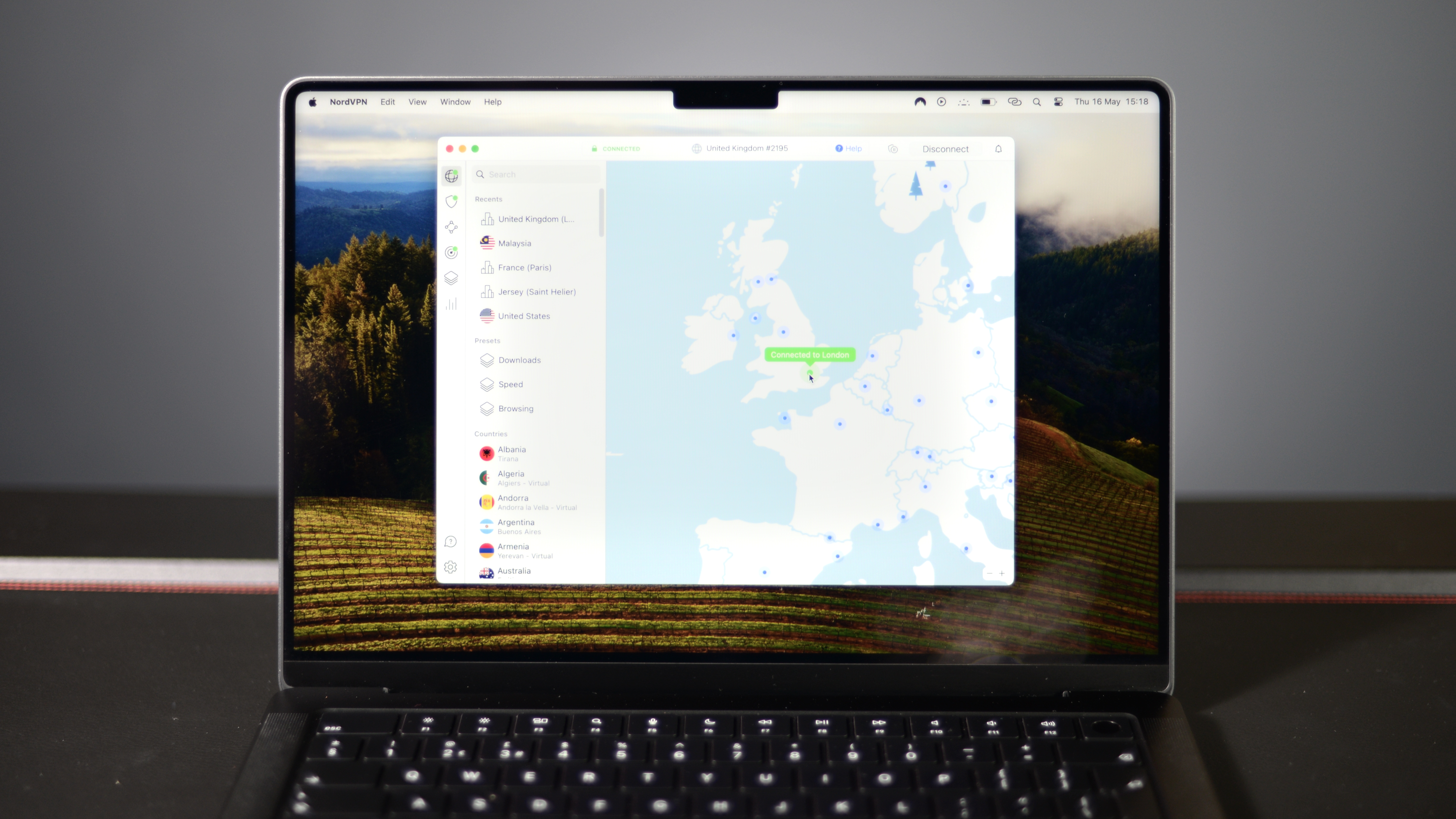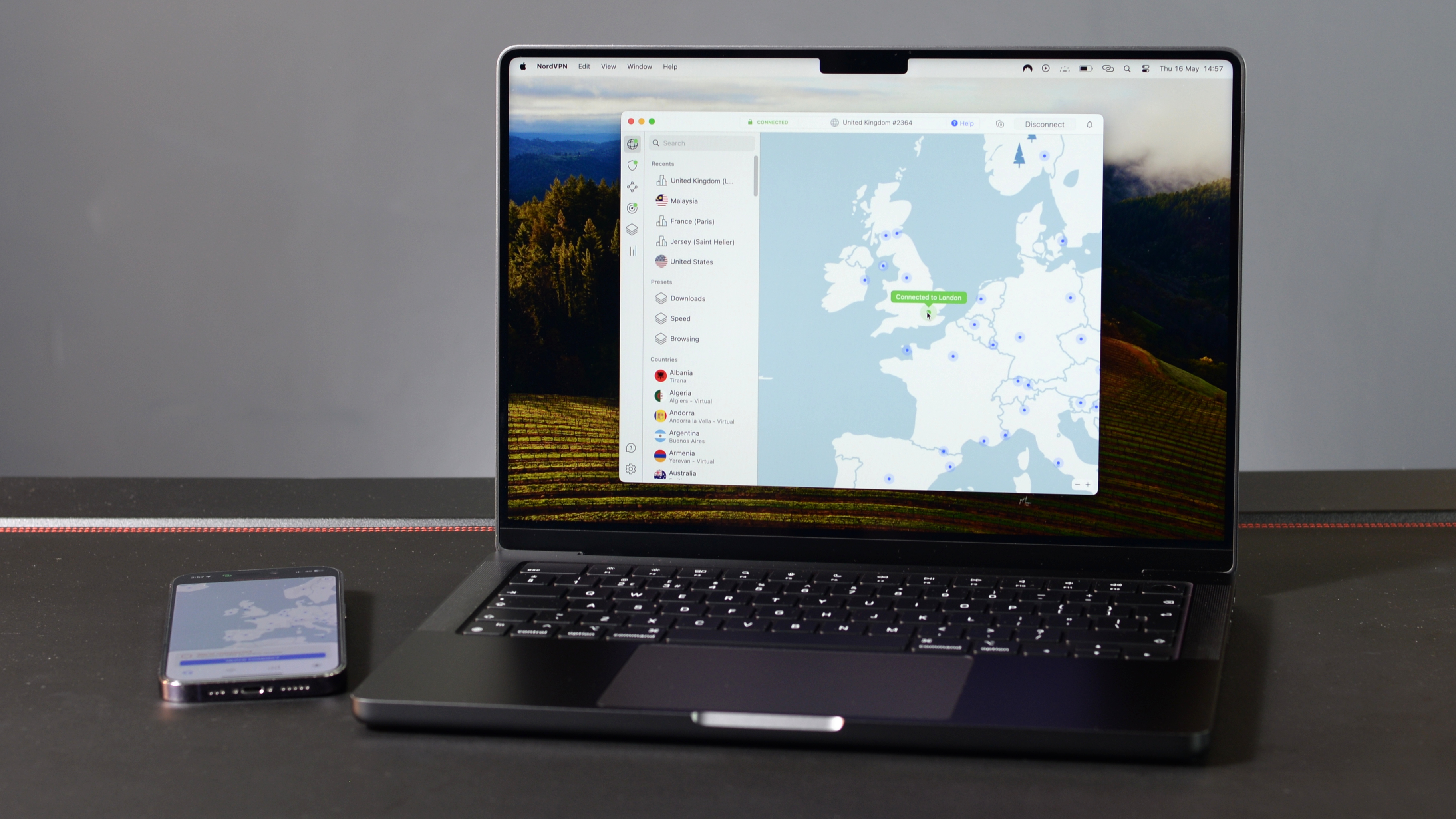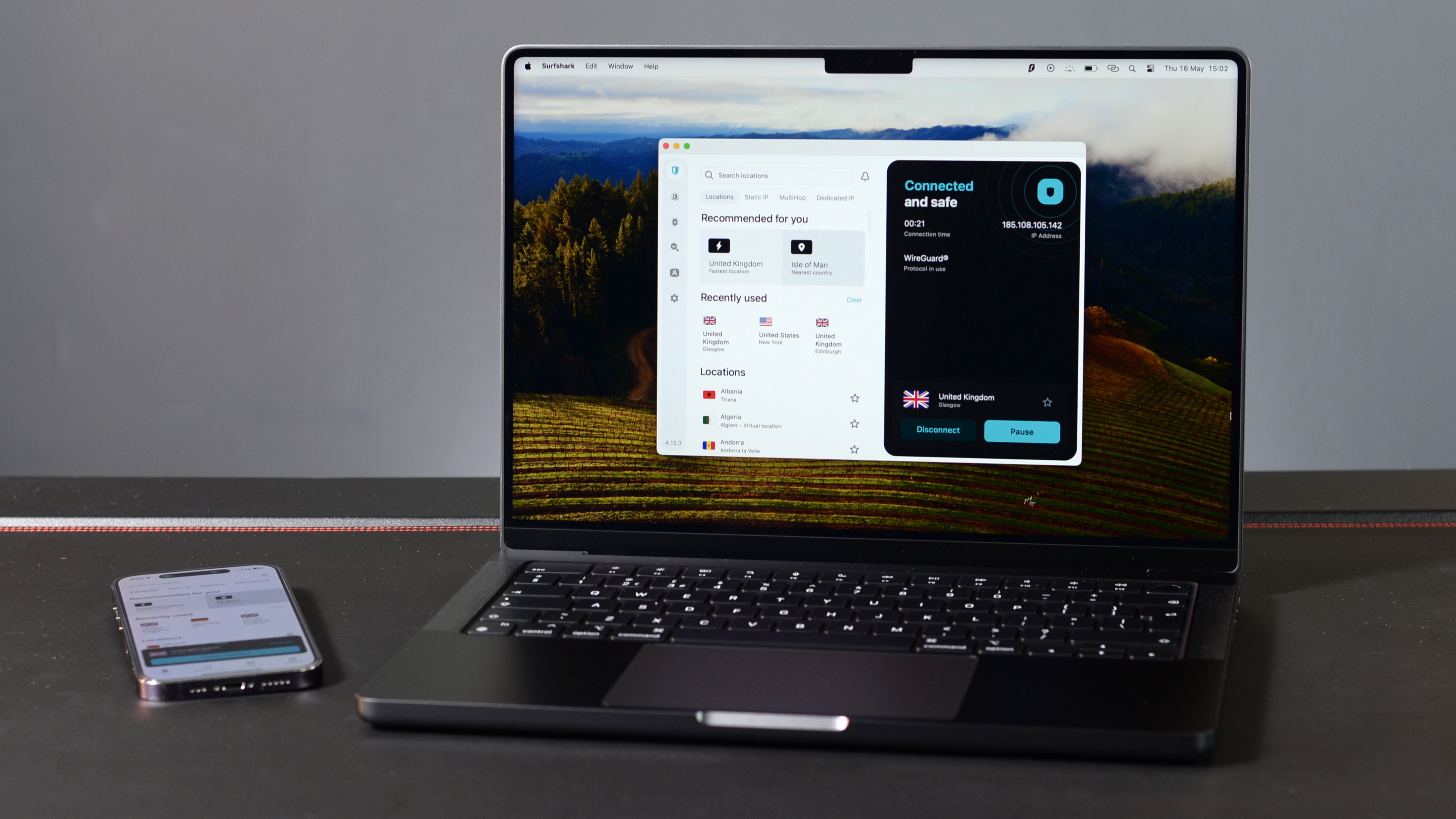
NordVPN came out as the best VPN overall in my most recent NordVPN review, impressing in almost every way. It's fast, offers excellent privacy features, it's easy to use, and it's not too expensive. No other VPN can match it in terms of all-round performance
However, there are tons of NordVPN alternatives out there, and you might find that one of them suits you better. Of these, I think ExpressVPN and Surfshark are the best NordVPN alternatives—ExpressVPN is perfect for beginners, while Surfshark is the best cheap VPN around.
On this page I'll be taking some of the best-reviewed VPNs and comparing them with NordVPN, focusing on five key areas: privacy, price, streaming, speed, and ease of use. Then you can weigh up the pros and cons, and go with the VPN that suits you best.
Best NordVPN alternatives in brief
NordVPN alternative 1: ExpressVPN
ExpressVPN is NordVPN's biggest rival, and when comparing ExpressVPN vs NordVPN, the two are hard to separate.
On the surface, NordVPN seems like the better deal—it's faster, cheaper, and has more servers. However, while NordVPN performs very well across the board, ExpressVPN does hold the advantage in some key areas.
NordVPN is a great choice for most people, and provides quality privacy and searing connection speeds at a reasonable price. With over 6,000 servers in more than 110 countries, its server network caters for almost everyone, and its streaming performance with sites like Netflix and BBC iPlayer is also unbeatable.
One downside I've found is that while Nord's apps are powerful and reliable, they can be a little awkward to use—especially on mobile. Beginners should be able to get by, but ExpressVPN is a better choice for absolute newbies.
For
- Unblocks Netflix, BBC iPlayer, Amazon Prime, Disney+
- Interesting additional privacy features
- Tons of servers
- Live chat support is quick and helpful
- Meshnet is innovative and very useful
Against
- Prices rise sharply on renewal
- Map-based interface awkward on mobile
- Windows app doesn't reconnect after a connection fails
ExpressVPN has a long history of providing quality privacy protection, and wrapping it all up in an simple and attractive package. There's no fuss when choosing one of its 3,000+ servers, and all of its settings are automated, so you can set and forget.
If you're looking for lots of extra features, NordVPN is better. ExpressVPN is a world-class VPN, but Nord offers more features and apps. ExpressVPN lags behind in terms of speed—although it's by no means slow—but it matches Nord's ability to unblock streaming sites.
For
- Almost every feature is independently audited
- Simple yet powerful apps on tons of devices
- Lightway protocol delivers excellent speeds
- Class-leading support team
- Innovative extras like Keys and Aircove
Against
- More expensive than some alternatives
- Excellent VPN, but no wider suite of privacy tools available
- Only 8 simultaneous connections
Detailed comparison
Privacy
NordVPN and ExpressVPN are evenly matched in terms of privacy. As two of the leading providers when it comes to protecting you from threats online, either one is a good choice if this is your only concern.
Both have audited no-logs policies, and use robust encryption protocols like Lightway, WireGuard, and OpenVPN. You don't get featured at the top my guides for nothing, and I consider both of these to be top of the pile privacy-wise.

Value
When it comes to price, NordVPN easily beats ExpressVPN. Starting at less than $3.50 per month—and often dropping near or below the $3 per month mark—it's priced toward the low end in the grand scheme.
Compared with ExpressVPN's lowest monthly price of $6.67, which includes a special deal that adds three months free for new subscribers, Nord's an absolute bargain.
A basic subscription to NordVPN will get you the VPN and the extra features included in the app like Onion over VPN, and Meshnet—which is free to non-subscribers, too.
Sign up to higher tiers and you'll also get malware protection, a data breach scanner, a tracker and ad blocker, a password manager, secure cloud storage, and cyber insurance up to $1M. The full package costs $5.99 per month—still less than ExpressVPN.
ExpressVPN doesn't have any higher tiers, and a subscription includes a password manager—which remains free even if you cancel—an adblocker, and an app tracker blocker. That's all you'll get, and at $6.67 it starts to look pretty steep.
Streaming
This will be a quick one—both NordVPN and ExpressVPN work extremely well as streaming and Netflix VPNs. I test a range of Netflix libraries, all of which both providers could access, as well as services like BBC iPlayer, Peacock, 10Play, ITVX, Channel 4, RaiPlay, and lots more.
There's nothing between the two VPNs here.

Speed
In our speed testing, NordVPN has consistently been one of, if not the, fastest VPN available. When using our 1 Gbps line, I've seen reliable speeds of over 950+ Mbps with the WireGuard-based NordLynx protocol.
ExpressVPN, on the other hand, topped out at around 410 Mbps when using Lightway. This isn't bad, but certainly can't compete with Nord's blazing speeds.
When using OpenVPN, ExpressVPN did pull ahead at 210 Mbps, which is very good for the old-school privacy-first protocol. NordVPN topped out at 110 which is pretty average.
If you're looking for searing everyday speeds, NordVPN is the clear winner here, but for those who know they'll be using OpenVPN, ExpressVPN is the better choice.
Ease of use
NordVPN isn't difficult to use, but some people find its apps a little tricky to get used to. For example, the map-based interface is quite nifty on the large screen of a laptop, but on a handheld device it can prove to be a bit awkward and cluttered. The home screen of the app is also quite busy too, which doesn't help beginners.
ExpressVPN is the opposite. Open the app on any device and all you'll see is the on/off button. If you just want to connect, you can tap that and close the app, not having to think about anything else.
There are plenty of features hidden in the settings for those who want to configure their connection too, and ExpressVPN easily takes this one.
NordVPN or ExpressVPN?
If I'm honest, you can't go wrong with either of these. However, if you're looking for a whole suite of privacy tools at a very reasonable price, you should go for NordVPN.
If you're a total newbie who has no interest in fiddling with settings and just wants a VPN to do its job, and do it quietly, go for ExpressVPN.
NordVPN alternative 2: Surfshark
Surfshark is owned by Nord Security, and while it is a separate entity, it does share a lot of NordVPN abilities and features—which is a good thing.
It's not "NordVPN Lite", either. It's a fully-fledged privacy suite that not only matches NordVPN is a lot of areas, but offers more in some. It's also an absolute bargain, so it's definitely worth considering.
When you start comparing NordVPN to Surfshark, rather than looking like the bargain option, Nord seems decidedly premium-priced. At over a dollar more per month, the big name's domination might start to seem shaky.
Typically, NordVPN comes out with the cutting-edge tech—Meshnet, for example—which Surfshark modifies later down the line, but there are unique features on both sides.
If you're looking for brand appeal, Nord's always going to win out here, but if you're not afraid of sacrificing that for a bargain, the decision isn't quite so clear.
For
- Unblocks Netflix, BBC iPlayer, Amazon Prime, Disney+
- Useful additional privacy features
- Tons of servers
- Live chat support is quick and helpful
- Meshnet is innovative and very useful
Against
- Prices rise sharply on renewal
- Map-based interface is a little awkward on mobile
- Windows app doesn't reconnect after a connection fails
Surfshark has always been a disruptor. When it first popped up on the scene it was a remarkably good VPN at a remarkably cheap price. Fast-forward a few years and the same is still true—it's genuinely one of the best services I've tested.
It has a wide server network, excellent connection speeds, and nicely laid-out apps for tons of devices. It's also stellar for streaming, matching NordVPN's unblocking record.
In my review I did find a minor privacy flaw concerning the kill switch, although this is unlikely to affect a normal user. Overall, it should be on your shortlist.
For
- Introductory offer is excellent value
- Seriously fast WireGuard and OpenVPN connections
- Excellent streaming performance
- Tons of features for most devices
- Unlimited connections
Against
- Heavy stress-testing caused kill switch to fail
- Significant price hike after first term
- Many virtual servers are hosted thousands of miles away from apparent locations
Detailed comparison
Privacy
Surfshark and NordVPN are on fairly level pegging when it comes to privacy. Both favor WireGuard-based protocols as their default options, both offer obfuscation (the process of hiding the fact you're using a VPN at all), and both offer kill switches and verified no-logs policies.
However, in my testing, I was able to break Surfshark's kill switch. While you're unlikely to be fiddling with root processes and actively trying to break things yourself, it's telling that both NordVPN and ExpressVPN withstood the same test.
Considering that, if privacy is your main concern, NordVPN is the better choice.

Value
If price is your biggest decision maker, though, you should definitely consider Surfshark. I've seen it as low as $2.05 per month, and never more than $2.49 per month. It's significantly cheaper than NordVPN, which very rarely drops below $3 per month.
In fact, I rate Surfshark as the best cheap VPN, and it's definitely the best service in its price range.
Streaming
NordVPN and Surfshark are both excellent streaming VPNs, unblocking everything I tested them with in my last round of reviews. This is perhaps unsurprising, considering Surfshark's Nord Security ownership and tech sharing, but if you're looking for a NordVPN alternative that can hold its own when it comes to streaming, Surfshark could be it.

Speed
Both NordVPN and Surfshark maxed out my 1 Gbps test connection when using WireGuard or NordLynx, and both provide very reliable connections that very rarely, if ever, drop out.
However, if you're an OpenVPN user, Surfshark is the better choice. NordVPN delivered around 110 Mbps using it, while Surfshark sped ahead at a massive 640 Mbps. This is the fastest connection I've ever seen from a VPN using OpenVPN.
If you're interested in why, this is because Surfshark uses something called Data Channel Offload (DCO). DCO sacrifices some of OpenVPN's capacity for obfuscation in return for much faster speeds. If you're seeking obfuscation, Surfshark does still offer this, and automatically detects when you need it.
For the average person, NordVPN and Surfshark are more than fast enough. If you know you'll need OpenVPN—perhaps for a router VPN—Surfshark is the better choice.
Ease of use
Just like ExpressVPN, Surfshark is tailored towards those who prefer a simpler experience, while NordVPN is quite a lot more complex. If ease of use is a priority, Surfshark is a better choice—although it's a fine margin.
NordVPN or Surfshark?
Again, as a whole package, NordVPN is the better VPN. However, if you're looking for a simple, cheap alternative, Surfshark is a very reliable service that offers very similar performance at a lower price.
► Other NordVPN alternatives
I think one of NordVPN, ExpressVPN, or Surfshark will be the best choice for the vast majority of people—they feature prominently in many of my detailed VPN guides because they're all such well-rounded products.
However, there are a few more VPNs that offer very good products that may suit you better. Below, I've quickly outlined their key features, and why they might be the right NordVPN alternative for you.







